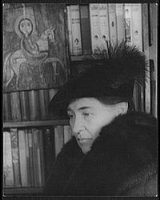
author who achieved recognition for her novels of frontier
life on the Great Plains
, in works such as O Pioneers!
, My Ántonia
, and The Song of the Lark
. In 1923 she was awarded the Pulitzer Prize
for One of Ours
(1922), a novel set during World War I
. Cather grew up in Nebraska
and graduated from the University of Nebraska. She lived and worked in Pittsburgh for ten years, then at age 33 she moved to New York where she lived for the rest of her life.
She was born Wilella Seibert Cather in 1873 on her maternal grandmother's farm in the Back Creek Valley
near Winchester, Virginia
(see Willa Cather Birthplace
).
No one can build his security upon the nobleness of another person. Two people, when they love each other, grow alike in their tastes and habits and pride, but their moral natures (whatever we may mean by that canting expression) are never welded. The base one goes on being base, and the noble one noble, to the end.![]()
It does not matter much whom we live with in this world, but it matters a great deal whom we dream of.![]()
The world there was the flat world of the ancients; to the east, a cornfield that stretched to daybreak; to the west, a corral that reached to the sunset; between, the conquests of peace, dearer-bought than those of war.![]()
The dead might as well try to speak to the living as the old to the young.![]()
The sun was like a great visiting presence that stimulated and took its due from all animal energy. When it flung wide its cloak and stepped down over the edge of the fields at evening, it left behind it a spent and exhausted world.![]()
Beautiful women, whose beauty meant more than it said... was their brilliancy always fed by something coarse and concealed? Was that their secret?![]()
Only solitary men know the full joys of friendship. Others have their family — but to a solitary and an exile his friends are everything.![]()
Sometimes a neighbor whom we have disliked a lifetime for his arrogance and conceit lets fall a single commonplace remark that shows us another side, another man, really; a man uncertain, and puzzled, and in the dark like ourselves.![]()
The great fact was the land itself, which seemed to overwhelm the little beginnings of human society that struggled in its sombre wastes. It was from facing this vast hardness that the boy's mouth had become so bitter; because he felt that men were too weak to make any mark here, that the land wanted to be let alone, to preserve its own fierce strength, its peculiar, savage kind of beauty, its uninterrupted mournfulness.![]()

